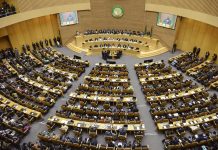(In continuation of our bid to ensure that visitors to our website get well-informed about the operations of key government agencies in Nigeria, we decided to ensure that each publication will feature at least one of such agencies and one top government functionary. Today, we focus on the NCC).
The Nigerian Communications Commission (NCC) is the independent regulatory authority for the telecommunications industry in Nigeria. The NCC was first created under Decree Number 75 by the Federal Military Government of Nigeria on 24 November 1992. The NCC was charged with the responsibility of regulating the supply of telecommunications services and facilities, promoting competition, and setting performance standards for telephone services in Nigeria. The Decree has been abrogated and replaced with the Nigerian Communications Act (NCA) 2003.
Organizational structure
The commission is headed by a board of nine commissioners, composed of the Chairman (a non-executive commissioner), the Executive Vice Chairman/Chief Executive Officer, two Executive Commissioners, and five other non-executive commissioners.
There are 20 departments, one directorate three other administratively constitutive sections which are the Offices of the Executive Vice Chairman/Chief Executive, and the Offices of the two Executive Commissioners. The Departments of New Media and Information Security; Technical Standards and Network Integrity; and Spectrum Administration report to the Executive Commissioner Technical Services. The Departments of Legal and Regulatory Services; Licensing and Authorization; Consumer Affairs; and Compliance Monitoring and Enforcement report to the Executive Commissioner Stakeholder Management. The remaining Departments report to the Executive Vice Chairman/Chief Executive Officer. Among the Departments that report to the EVC/CEO is the Universal Service Provision Fund – established under the Nigerian Communications Act 2003 to facilitate the achievement of national policy goals for universal access and universal service to information and communication technologies (ICTs) in rural, un-served and under-served areas in Nigeria. The Fund is being managed to facilitate the widest possible access to affordable telecommunications services for greater social equity and inclusion for the people of Nigeria.
The Offices of the Executive Vice Chairman/CEO; and the Offices of the other two Executive Commissioners also have established and functional administrative structures. The International Affairs Unit is part of the Office of the Executive Vice Chairman/Chief Executive.
The mandate of the Nigerian Communications Commission is established in the Nigerian Communications Act 2003, which was signed into law by the President, Chief Olusegun Obasanjo on the 8th of July 2003 after being passed by both Houses of the National Assembly. The Act provides the NCC with the capacity to properly carry out its Regulatory functions and activities.
Functions of the NCC
The functions of the Nigerian Communications Commissions are derived from Section 3 of the Nigerian Communications Acts (NCA) of 2003
Giving written directions to licensees,
Consulting with Consumers, commercial and industrial organizations,
Delegating its functions to a Committee constituted by it,
Summoning persons to appear before the Commission,
Entering into contracts with any company, firm or persons,
Establishing and maintaining subsidiaries to enable the discharge of its functions,
With regard to licensing, the NCC has been granted powers including the following:
With Issuance of licenses and imposition of terms and conditions on licenses,
Variation or revocation of a Condition of license,
Consulting with affected licensees before bringing into force an obligation which may be onerous on the licensee,
Approving guidelines for keeping of accounts and cost allocation formula of licensees,
Inspection of licensees’ books of accounts,
Granting or revoking of permits for connection of customer equipment,
Determination of principles to guide interconnection arrangements between operators, and
Determination of services and new undertakings eligible for licensing from time to time.


















